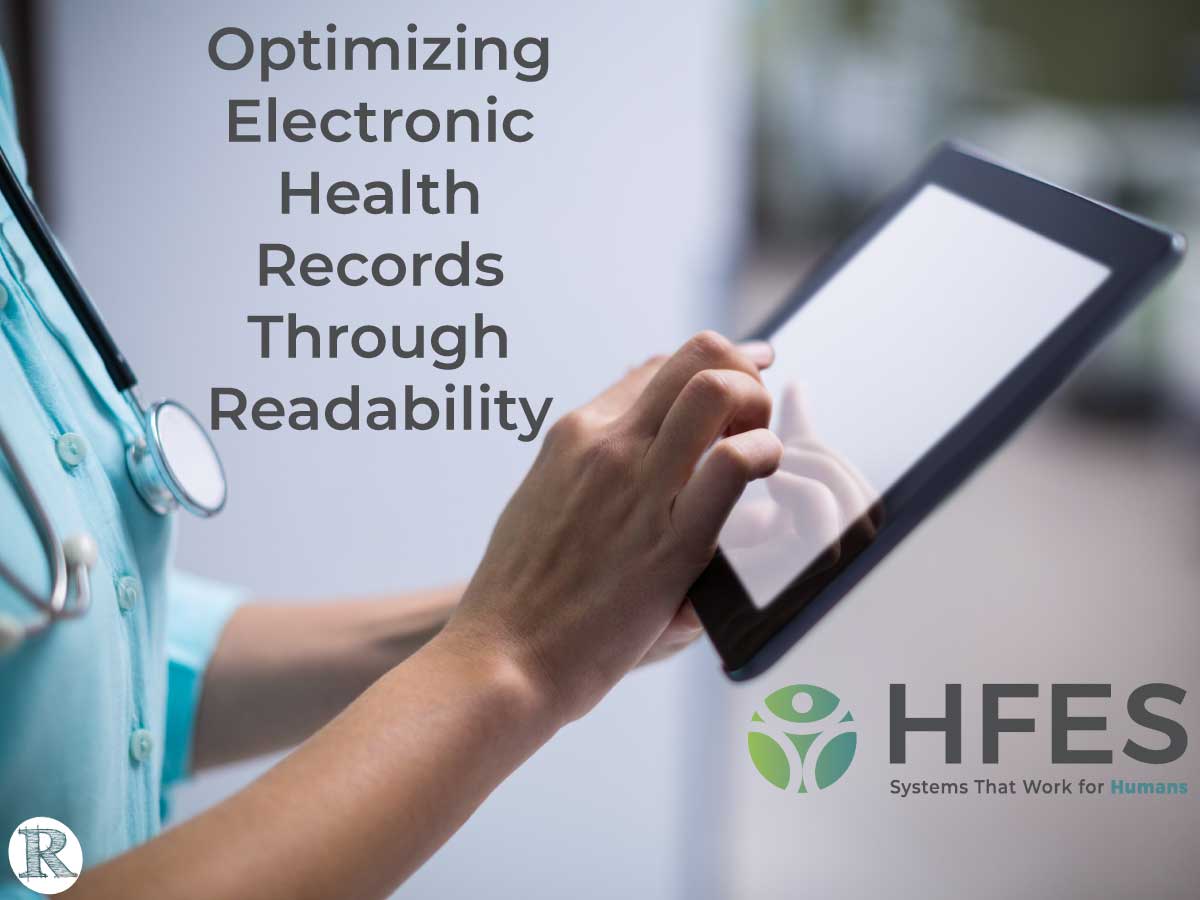Research Highlight: Readability Promises to Improve Medical Outcomes
This summer Rachel Ball, Dave Miller, Shaun Wallace and their team submitted their medical readability study in the Proceedings of the 2021 International Symposium on Human Factors and Ergonomics in Health Care. The promising results point to a future where personalized reading formats could improve reading speed and accuracy when working with medical materials.
Using History of Present Illness (HPI) reports written by physicians, the team investigated how different fonts impacted medical text reading speed and comprehension. The team tested 25 individuals with a reading speed test using six common fonts, following the work of Wallace et al. (2020). The participants read both medical and non-medical reading material and answered comprehension questions. Results demonstrated that Personalized Reading Formats (PRFs) accelerated reading of medical passages by 15% while maintaining comprehension levels.
Implications for Readability: Better Readability can Improve Medical Outcomes
“Medical errors are an “epidemic” that claim hundreds of thousands of lives annually,” observes US News and World Report. A 2016 Johns Hopkins study estimates the impact at more than 250,000 deaths per year.
Medical professionals — including doctors, nurses, and technicians — all have tremendous reading demands in their daily work. This can cause fatigue and reduced accuracy both of which impact patient care and outcomes.
This study provides evidence that personalized changes to increase legibility could improve the reading speed in medical materials, for participants without medical expertise. The team plans future research with medical professionals to investigate the effect of this intervention on people with substantial domain-specific knowledge.
Optimizing Electronic Health Records Through Readability
Rachel V. Ball, Dave B. Miller, Shaun Wallace, Kathlyn Camargo Macias, Mahmoud Ibrahim, Ernesto Robalino Gonzaga, Olga Karasik, Dekai R. Rohlsen-Neal, Sarah Barrientos, Edward A. Ross, Abdo Asmar, Ashley M. Hughes, Peter A. Hancock, Ben D. Sawyer
Abstract
Medical professionals engage in an enormous and ever-increasing amount of reading in Electronic Health Records (EHRs), which may have adverse impacts on patient care. Personalized readability formats (PRFs) may help to accelerate reading these records, without training, and without adversely affecting comprehension in this critical task. Using History of Present Illness (HPI) reports written by physicians, we investigated how personalized fonts impacted medical text reading speed and comprehension. Crowd- workers without medical training read a set of eighth-grade level passages in six common fonts to determine their fastest and slowest fonts, which were then used to display a set of HPI reports and accompanying comprehension questions. Results showed that PRFs accelerated reading of medical passages by 15% while maintaining comprehension. This finding suggests that individualized information design like PRFs, and specifically font optimization, may be a straightforward way to optimize EHRs through readability. We see a future in which PRFs may help physicians in reading medical information, and look toward future studies investigating PRF impacts on medical professionals’ EHR reading.
Citation: Ball RV, Miller DB, Wallace S, et al. Optimizing Electronic Health Records Through Readability. Proceedings of the International Symposium on Human Factors and Ergonomics in Health Care. 2021;10(1):65-70. doi:10.1177/2327857921101028
 About University of Central Florida (UCF) Research: UCF researchers drive intellectual capital and innovation to solve today’s most pressing problems. As a metropolitan research university, we promote economic development in the region by aiding in the transfer of technology and other discoveries between university and industry to create next-generation ideas and products. Our graduates, who benefit from working alongside our research faculty, also contribute to the economy by driving innovation through local company employment or by launching their own businesses. From nanoscience and simulation to healthcare and the environment, UCF researchers work together to have real-world impact, improving the lives of our students and community. See https://www.ucf.edu/research/ for more detail.
About University of Central Florida (UCF) Research: UCF researchers drive intellectual capital and innovation to solve today’s most pressing problems. As a metropolitan research university, we promote economic development in the region by aiding in the transfer of technology and other discoveries between university and industry to create next-generation ideas and products. Our graduates, who benefit from working alongside our research faculty, also contribute to the economy by driving innovation through local company employment or by launching their own businesses. From nanoscience and simulation to healthcare and the environment, UCF researchers work together to have real-world impact, improving the lives of our students and community. See https://www.ucf.edu/research/ for more detail.




